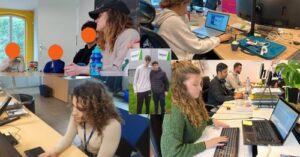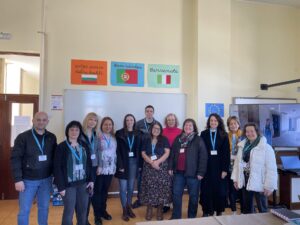Context of entrepreneurship teaching in Bulgaria Entrepreneurship is among the most important factors for building and developing a market economy.
Within EU, entrepreneurship and training thereon are considered to be a crucial aspect for the community’s prosperity. Over the last few years, talk has increased of entrepreneurship throughout education, starting from the first school years. Following an ordinance issued in Bulgaria, 20 general education school subjects were introduced for primary education, including the “Technologies and Entrepreneurship” subject, divided into several stages. Classes begin in first grade and continue up to twelfth grade included, in accordance with the students’ level. Preparation is done by means of specialized subjects. The mandatory entrepreneurship classes are Entrepreneurship and Information
Technologies or Entrepreneurship and Geography and Economics.
Why is it important to start teaching entrepreneurship at an early age?
Entrepreneurship is a crucial element of XXI-century skills. Through it, students develop the skills needed
not only in terms of school subjects, but also basic skills such as morale, creativity and a positive attitude
to learning.
It is not by chance that the European Union determines entrepreneurship and initiative to be one of the eight key lifelong learning competences; their acquisition thereof needs to be ensured for young people by the school system of each member state. This is a long processes that lasts years and needs to be structured so that in each subsequent year the knowledge and skills build on those obtained the previous year.
In primary education, young pupils can get acquainted with the concept of the individual and the role they play as consumers, realize the role of the family and its economic responsibilities, obtain practical knowledge of natural, human, and capital resources.
Approaches to entrepreneurship teaching
In order for entrepreneurship teaching to be effective and to obtain the results desired by society, various instruments need to be employed. Some of them include transformation of the teacher’s role in the classroom – from instructor to facilitator, which allows children to find out answers themselves, and gives more freedom to the teacher. Another instrument is the involvement of business people in the learning process, which will improve the connection between education and business. This could be done by means of mentorship and active sharing of experience by the business and participation in various educational formats that allow students to freely talk with professionals. Team work is also
important for the purpose of creating vital work habits, and last, but not least, using more interactive and unconventional teaching methods, encouraging active joint work between different schools and organizing contests and other formats. This would allow young people to demonstrate their knowledge and skills and will create possibilities for new acquaintances.
In order to inspire their students and allow them to develop entrepreneurship, teachers also need to possess a wide range of creative and entrepreneurial skills. They too need a school environment that encourages creativity and risk-taking, and mistakes are regarded as learning opportunities.
Entrepreneurship training is more than preparing to manage an enterprise. It also includes the building of entrepreneurial attitude, skills and knowledge to allow the student “turn ideas into actions”.
Good practices
 A good example is „MENTEE – Mentoring, Networking ND Training for European Entrepreneurs” – a project funded under the Erasmus+ programme. Through it, the experienced entrepreneurs who participated were able to become active mentors, and beginners and young entrepreneurs had the chance to benefit from shared practical knowledge. MENTEE e-learning tools have helped for this purpose.
A good example is „MENTEE – Mentoring, Networking ND Training for European Entrepreneurs” – a project funded under the Erasmus+ programme. Through it, the experienced entrepreneurs who participated were able to become active mentors, and beginners and young entrepreneurs had the chance to benefit from shared practical knowledge. MENTEE e-learning tools have helped for this purpose.

The project „School Class 2 Business Class” gave participants the opportunity to learn everything related to starting their own company. During the pilot activities of the project at the National High School in Finance and Business, students were supported and advised by real entrepreneurs – company managers, and this created a solid foundation for the program to enter the secondary level of education. The project developed learning materials that will prepare students for running their independent business.

The project „Entrepreneurial Learning in Art Schools 2.0“ aims to help art schools give their students the necessary entrepreneurial skills needed before they enter the work field. El-Art is set up to help integrate entrepreneurship in European art schools through the development and distribution of teaching material and training programs for teachers and students. The aim of the programme is to help art schools give their students the entrepreneurial skills
necessary to thrive before they enter the working arena. The material Creativity as a Career produced by
El-Art is also suitable for starting creatives who are looking to strengthen their entrepreneurial skills.





